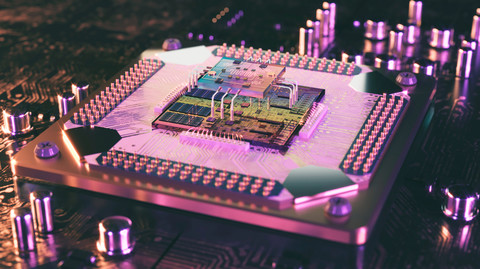My article in BUSINESS INSIDER published 8thof August 2018.
What has made quantum computers so exciting lately? Perhaps the fact we are approaching the limits of computing capabilities of the kinds of transistor-based machines we have long been using. They are limited by the laws of physics, which prevent us from packing more processors on a chip board.
The old transistor computer …
Today’s processors consist of billions of transistors, each a few nanometers in size, crammed onto a very small surface. According to Moore’s law, the number of transistors in a microprocessor doubles every two years. Unfortunately, computational power increases have slowed down lately. This is because we are gradually reaching the technological boundaries of how many transistors can be “crammed” onto such small surfaces. The limit, which can not be exceeded physically, is transistors reduced to the size of a single atom with a single electron used to toggle its state between 0 to 1.
… and its kid brother, the quantum computer
Quantum computing relies on the intermediate state, thus moving beyond the scheme of two opposing values. The qubit (short for quantum bit), which is the quantum unit of measure, can assume the state of both 0 and 1 simultaneously or, to be precise, take on an infinite number of states between 0 and 1. This property is referred to as superposition. Only when the value of a qubit is checked does it ever assume either of the two basic states of either 0 or 1.
While the difference seems to be minor, a superpositioned qubit can execute multiple calculation commands at a time, helped by the fundamental laws of quantum physics. Physically, a qubit can be represented by any quantum system with two different fundamental states such as an electron or atom spin, two energy levels in an atom, or two levels of photon polarization – vertical and horizontal.
This completely unreal situation becomes reality when using a quantum computer. A machine of this kind can process data even hundreds of thousands, and theoretically millions of times faster than devices relying on advanced silicon components! An ideal use for such a machine would be to recognize objects in a huge stock of photos, process large numbers, or encrypt and decrypt codes. By using mathematical data, we can theoretically increase the performance advantage of a quantum over a conventional computer to 1:18 000 000 000 000 000 000 times!
Probabilistic algorithms
The creation of quantum algorithms is a big challenge as they must adhere to the laws of quantum mechanics. Algorithms executed by a quantum computer follow the laws of probability (hence, they are referred to as probabilistic). This means that if the same algorithm is run twice on a quantum computer, the randomness of the process may cause it to produce different results. Simply put, in order to generate reliable calculation results, one should apply the principles of probability.
Quantum computers are perfectly suited for specific highly-specialized calculations that rely on algorithms to harness their full power. Some of the most common applications of probabilistic algorithms are the Miller-Rabin’s test of numbers for primality (which has extensive applications in cryptography) and Quicksort, a rapid sorting algorithm. All this means that quantum computers are unlikely to appear on every desktop or in every home any time soon.
However, no matter how long it takes for a given algorithm to generate a result, we can easily imagine, even today, a scenario in which a quantum machine is needed to solve a specific problem.
Read more in the full article.
Link to the full article (in Polish)
Related articles
– Blockchain poised to shake up our lives
– Will quantum computers doom the blockchain?
– Machine Learning. Computers coming of age
– Blockchain – the ultimate financial crash
– Blockchain – the Holy Grail of the financial system?
– What is blockchain? All you need to know
– Blockchain has a potential to upend the key pillars of our society










Adam
Excellent article. Hats off to author for providing clarity and easy to understand lingo for such complex, techno subject.
John McLean
I was just reading about quantum computing the other day on LinkedIn, though they had the opposite opinion! Great to get both sides.
Tesla29
If quantum computer take a “real body” we will have a serrius problem with security. A “quantum logic” will supersede the World “classic logic”. Just like Shrodinger’s cat changed our perception, in the same way we will be able to remodel/redefine the security hacking problems in “quantum logic” – to prepare “quantum cyber attack”
TommyG
Nice read Norbert
CaffD
You are absolutely right that naively designed AI would simply inherit the biases, but there is certainly hope that a properly implemented AI tool can be more fair than human decision makers. I agree with you completely that it’s not a panacea, but as you say this is an area of active research.
Check Batin
The problem with quantum computing, as the article mentions in passing, is the decoherence problem – a particle interacts with its environment, so that its state transition probability no longer contains interference terms typical of a quantum system. As such, the system behaves classically. To get around this, you need huge amounts of energy to keep the system cold for enough time. This is the barrier between the dream and reality.
My concern about quantum hype is that investors and large corporations are getting on the bandwagon. While it is nice to have money coming into an idea, it isn’t smart money. The decoherence problem was noted in the 70’s, and no one has been able to solve it, but suddenly, now that investors have created a hype bubble, the assumption is that the problem will be solved within 5 years. This is a law of the universe, not something a bunch of kids can write a bit of JavaScript to get around. Once investors lose patience, the money will leave, and probably the more stable grant money will leave as well. Quantum computing as a field will come to a standstill.
JohnE3
Quantum computers will help greatly with security, in medicine ,weather forecast, traffic control. It sure will solve complex data problems.I am not surprised many computer giants are investing into its research. Thanks for sharing
John Accural
Even in Star Wars Humans were commanding final strikes … so there might be still hope for all 5 stars generals !
Oscar2
A full-blown quantum internet, with functional quantum computers as nodes connected through quantum communication channels, is still some ways away, the first long-range quantum networks are already being planned.
TomCat
Very true and good statement.
Tesla29
This is an exciting time to combine machine learning with quantum computing. Impressive progress has been made recently in building quantum computers, and quantum machine learning techniques will become powerful tools for finding new patterns in big data.
And99rew
Non-quantum algorithms that are used to analyze the data can predict the state of the grid, but as more and more phasor measurement units are deployed in the electrical network, we need faster algorithms. Quantum algorithms for data analysis have the potential to speed up the computations substantially in a theoretical sense, but great challenges remain in achieving quantum computers that can process such large amounts of data.
Adam Spikey
Excellent Norbert – thank you!
Back in the day (post Y2K, right before I joined Sun Microsystems – dotcom boom/bust, 9-11) when I was a Business Technologist for Computer Associates in NYC packaging and pitching “Neugents” – a sniglet for Neural Agents, we were very careful about the use of the term AI. Personally, I thought what we had then were highly functional decision trees. We also refer to it as Expert System. Today, it appears we freely use and package AI for marketing and start-up purposes. I think your Data Science article and comparative analysis does an excellent job in distinguishing AI or AGI (Artificial General Intelligence) from the rest…
AdaZombie
We are now at an exciting moment in time, akin to the eve of the classical internet. Recent technological progress now suggests that we may see the first small-scale implementations of quantum networks within the next five years.
CaffD
I mean, the biggest promises of quantum computing still only relate to very specific workloads. You won’t be playing Crysis 15 on a quantum computer. Unless by “playing” you mean a quantum co-processor is used to do something very specific like accelerating some AI thing in the game.
Norbert Biedrzycki
Having a separate processing unit dedicated to a special kind of task because it excels at it has been done before. Just think of GPUs (aka Graphics Cards). They’re great for things CPUs are bad at and vice versa.
I think the challenge will be communicating tasks and problems between the three and determining which of them would solve a given problem/task the fastest.
TonyHor
Sometimes I have a feeling I’m already working for robot 😉 Thanks God I know the guy 🙂 Razvan Atim must be either using UiPath RPA with #AI capabilities to respond to my e-mails or he is operating 24/7;)
johnbuzz3
Quantum computing is expected to solve computational questions that cannot be addressed by existing classical computing methods. It is now accepted that the very first discipline that will be greatly advanced by quantum computers is quantum chemistry.
Norbert Biedrzycki
No computer scientist would read this title and think that a quantum computer can handle incomputable problems, because… well, they can’t. No kind of computer can (unless you start dealing with weird hypotheticals like “what if the computer can ask God questions?”). That’s what incomputable means.
It’s totally reasonable to say “impossible” in this context, that’s what most people in the field would say to someone outside the field in order to quickly communicate the point. We don’t say bin packing takes too long, we say it can’t be done (even though, theoretically, we don’t know that for sure).
CaffD
Amen
CaffD
Does that not make the ethicist philosophically weak? He seems to have caved to the pressure of other parties, the former Nokia executive for example in removing the red lines from the piece. If HE cannot have the wherewithal to put a foot his foot down and say no I will not remove this red line. What hope do other people have? What hope does an computer scientist developing the AI have if they think something is wrong with the AI being developed, to stand up and say hey no. If someone whos literal job it was to create this rule set couldnt stand up to people.
If you so strongly believe that what is being done is just bad ethics why be aparty to it or seemingly abet this whitewashing behavior that opens more gaps in the rules than producing meaningful results.
TommyG
Being willing to bet a fistful of dollars they are ion traps given that op said 10 mill kelvin was the temp.
Edit: two things, I owe someone a fistful of dollars and I have learned a number of things. Breaking even in my book.
TommyG
A regular computer has sets of bits, which can either have a value of 0 or 1. A quantum computer has qubits, which can be 0 or 1 or both
TommyG
The majority of the great blue chip companies were built this way: IBM, U.S. Steel, General Electric, Walmart, and Ford are just some examples. But today’s business reality is very different. We live in a world of bytes – and for the first time technology and commerce have collided in a way that makes data far more valuable than physical, tangible objects.
johnbuzz3
The power of a quantum computer can be roughly estimated by the number of qubits, or quantum bits: each qubit can represent a 1 and 0 state simultaneously. There are a number of promising hardware approaches to quantum computing, including superconducting, ion trap, and topological.
Norbert Biedrzycki
Quantum computing basically increases power like so: you already gain power by being allowed to flip coins and accept a margin of error. Quantum processors have all the advantages of probabilistic processors, but also have the capacity to interfere quantum events into nonexistence, which allows all kinds of unintuitive shit. Like the counterfactual bomb tester–now that is something that’s impossible.
John McLean
Hi Norbert, Excellent article that you have written. Very insightful. Have a great rest of the week.
Zoeba Jones
Totally agree. Product designed on customer-centric approach – that’s remarkable true. But their success stays far behind technology which is only a tool – it’s based on consistent business strategy and diligent execution – that’s what they have done. In this case blaming technology is like blaming electricity for someone’s big idea. It’s perfect example of digital transformation usage in a proper way „just” to reach goals. So not technology but strategist’s mind is main disruptor:)
And99rew
… and LinusTech (YouTube) does a good behind the scenes of D-Wave’s quantum computers in action. D-Wave is the only commercially available working quantum computer. The refridgeration for their chips is one of the coldest places in the cosmos – gets pretty close to absolute zero. I found it really cool that this cooling is essential to the function of the computer – it is necessary in order to utilize the quantum effects that only occur at these cold temperatures. Any heat at all and the quantum effects become corrupted… Pretty cool (pun) huh?
TomHarber
Can we count on freedom in action or rather on subordination to someone or something?
But more important seems to be whether transparency of information may affect the election of those who will manage them.
And99rew
I’m not an expert, but many believe Shor’s algorithm, which can quickly factor a polynomial, can be used to break most private/public key hashing or encryption schemes. It requires a quantum computer. It brings polynomial factorization from factorial time to polynomial time – meaning what would normally take 100 quadrillion years might now now take weeks. And as far as I know, you don’t need a 1024 bit quantum computer to break a 1024 bit code. Less bits will just take longer, but not unfathomably longer.
AndrewJo
We need to discover a new things to make a consumer model;
a) Cheap perfect isolation. To keep the chip cold.
b) Cheap, hot super conductors. To make a super conductor you have to goto under a kelvin in temperature. This is the biggest hurdle. If we can increase the temperature for the superconductor, then it makes making a consumer model much easier.
Going back to the 70s, the innovation that made the computer able to be used by consumers was photo lithography to etch very fine details into silicon. This shrunk CPUs into the sub micrometer range. This is why they were called microchips. We’re now able to focus into the nanometer range, so technically we should start calling modern chips “nanochips”.
TomHarber
Good one 🙂
TommyG
There seems to be a theoretical limit to any Moore’s Law-type trend that will apply with quantum circuitry. And Moore’s Law is already exhausted for classical circuits without even needing a theoretical reason to be exhausted. There’s no reason to think spatial density of switches is a chief concern for the efficiency of quantum computers. Unless you’re inferring some analogous exponential scaling trend for the size of dilution refrigerators, which would make more sense.
CaffD
If you own the physical hardware, then it’s directly on you to keep it running. But, you also have complete control over how secure the storage method is. How many backups do you want, do you want a RAID setup, etc.
If you do not own physical hardware, the storage service could just shut down tomorrow, and you’re up shit creek without a paddle. And this has happened quite often in the past.
Of course the obvious answer to this is to just back up your data elsewhere, whether it’s another physical or cloud-based device. But what about data that you can’t back up? A lot of cloud services out there are decentralized.
For example, there’s cloud computing, which is a good way of getting extra computational power if you don’t have a powerful computer to do things like rendering or scientific computing. But, you’re entirely at the mercy of what the system admins deem acceptable, the pricing, how their particular system is set up, etc.
Streaming services are another place where this happens. There’s constantly a war between Netflix, Hulu, and Amazon monopolizing shows that people want to watch. Signed up for Netflix to watch a series, except that series gets moved to Hulu a week later? Now you have to sign up to Hulu (or, more commonly, take to the high seas), and you can’t get a refund from Netflix. Rely on Spotify to listen to music, but the artists you like ended up being pretentious asses and left? You’re not getting a refund for premium. Sign up for a game streaming service that goes under a day later? You’re fucked, and now you have none of the games you signed up for.
That’s the main argument to still having physical things, whether it’s data you’re storing or hardware you’re using. At that point, you’re limited by how much you want to take care of the physical thing, rather than leaving it up in the air for some sleazey silicon valley exec to keep running.
johnbuzz3
What could we possibly need home quantum computers for? Everything is moving to cloud computation. Your phone will be the receiver and it will link seamlessly to a keyboard and mouse and monitor through Thunderbolt X.1.
You wont have a need for a computer tower in the future unless youre one of those “physical hardware hackers”. Its like you dont even enjoy the fingerchips that allow typing on any surface at any angle.
Keep up with the times
PiotrPawlow
Great, just great. I just bought the 30 cubit quantum computer because the friggin’ sales guy said it was going to be the hottest thing going for years. Now it’s past the 30 day Micro center no hassle return and it’s lost half it’s value if I tried to dump it on eBay. I’ll probably just keep it as a backup computer because playing Battle Toads on this puppy is incredible. Still, make me an offer.
Zidan78
Apples and Oranges my friend – transistors do not need to be near absolute zero to operate, nor are they subject to time based decoherance (among MANY other differences). On a similar theme, Moore’s law effectively ended for silicon when Apple reached 10nM manufacturing standards, meaning that trace widths are ~ tens of copper atoms wide.
Tom Jonezz
Ugh, lets just hope that there are techniques to design quantum computers, that are sped up by quantum algorithms.
Sounds like profitable nuclear fusion: ready in 20 years
Check Batin
Will be fascinating to see if the scaling problems can be overcome – MIT described it as potentially an inverse Moore’s law – every doubling of qubits will take twice as long and cost twice as much.